 Petzlover
PetzloverAmerican English Coonhound is originated from United States but Bull and Terrier is originated from United Kingdom. American English Coonhound may grow 19 cm / 8 inches higher than Bull and Terrier. Both American English Coonhound and Bull and Terrier are having almost same weight. Both American English Coonhound and Bull and Terrier has almost same life span. American English Coonhound may have more litter size than Bull and Terrier. Both American English Coonhound and Bull and Terrier requires Low Maintenance.
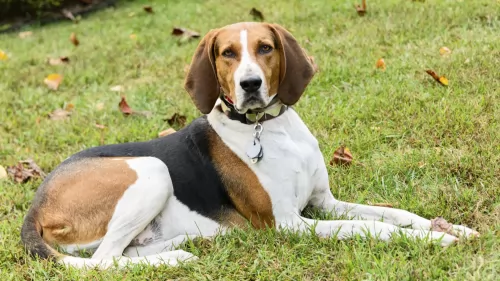 The American English Coonhound was developed in the Southern part of the United States from the variety of English hunting dogs that came to the States with the early settlers. At one point they were known as the Virginia Hound. This breed is well known for its prowess in hunting raccoons and her endurance and speed. Of course as a hound dog he loves to howl during the hunt and at home with the family. He can be frustrated and destructive if his energy and need for a job are not satisfied.
The American English Coonhound was developed in the Southern part of the United States from the variety of English hunting dogs that came to the States with the early settlers. At one point they were known as the Virginia Hound. This breed is well known for its prowess in hunting raccoons and her endurance and speed. Of course as a hound dog he loves to howl during the hunt and at home with the family. He can be frustrated and destructive if his energy and need for a job are not satisfied.
The Bull and Terrier is a blend between a number of Old English Terriers and the Old English Bulldog. It is believed that this extinct dog was the start of breeds such as the American Pit Bull Terrier and the Staffordshire Bull Terrier.
They were excellent for hunting rats and weren’t a true breed. The dog was popular in the British Isles and in the United States in the 19th Century. They became rare as different varieties of Bull and Terrier were bred and standardized.
Most terriers have a good deal of Old English Bulldog blood in them so as to provide them with the courage to fight and hunt prey, while the English Terrier blood provided a feisty temperament and longer legs for speed.
Around 1860, the Bull and Terrier breed split into 2 categories – the pure white Bull Terrier and the ones of color. The Bull and Terrier was never recognized as a standardized breed by any of the kennel clubs.
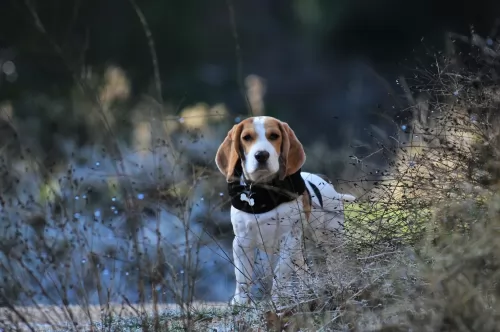 The American English Coonhound is an athlete with a deep chest and cute face. They have broad heads, domed skulls, dark eyes and soft, low ears. They are as fast and athletic as they look. These are highly athletic dogs with long legs and a slim but muscular body. They are so well built for their hunting role, that any deficiencies are quickly identified and bred out of the breed.
The American English Coonhound is an athlete with a deep chest and cute face. They have broad heads, domed skulls, dark eyes and soft, low ears. They are as fast and athletic as they look. These are highly athletic dogs with long legs and a slim but muscular body. They are so well built for their hunting role, that any deficiencies are quickly identified and bred out of the breed.
There isn’t too much detail and information on the Bull and Terrier but we can be sure that with the cross between the Old English Bulldog and the Old English Terrier, he would have been a small to medium sized compact, muscular dog, standing roughly between 38cm to 50cm in height and weighing anything in the region of 11 to 22kg.
He would have had a big head, and most of the dogs had a medium to long tail. His coat was of many colors such as white, fawn, tan or brindle and would have been short and smooth.
As far as temperament goes, the Bull and Terrier would certainly be courageous, feisty, independent, strong and energetic. Socialization wasn’t available in those days but with training, this intelligent breed would be affectionate with his human family.
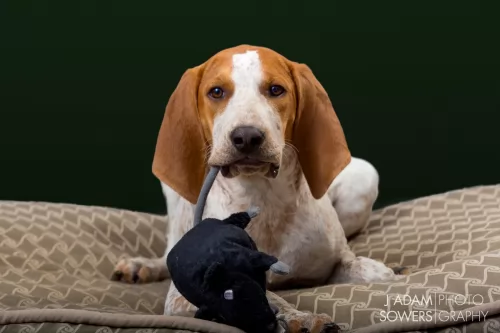 The American English Coonhound knows how to relax just as much as he knows how to work. He is mellow after work and tenacious in the chase. This is not the dog for a first-time owner. They are stubborn and hard to train. They howl and bark at home as much as they do on the hunt. They need a strong pack leader, especially when living in the city or neighborhoods.
The American English Coonhound knows how to relax just as much as he knows how to work. He is mellow after work and tenacious in the chase. This is not the dog for a first-time owner. They are stubborn and hard to train. They howl and bark at home as much as they do on the hunt. They need a strong pack leader, especially when living in the city or neighborhoods.
They are outgoing and friendly and very sensitive. They mature later than most other breeds their size. They are about 2 when they mature.
Nobody seems to be 100% sure when the classic Bull and Terrier dog became extinct but it is strongly assumed that it was some time between 1890 and 1920.
People believe that there are actually surviving breeds that could be considered Bull and Terriers. One thing is sure, when you consider that the Bull and Terrier is actually made up of several breeds such as the Bull Terrier, the Staffordshire Bull Terrier, Boston Terrier and American Pit Bull Terrier then you can imagine the character of the dog – brave, hardy, intelligent, feisty, bold, confident and fearless. He was a dog who loved his human family and would have been both friend and protector.
These dogs have been popular around the world, and have had a strong influence in the development of a number of other breeds. Even today, breeders are always looking at ways to develop new breeds based on the descendants of the Bull and Terrier.
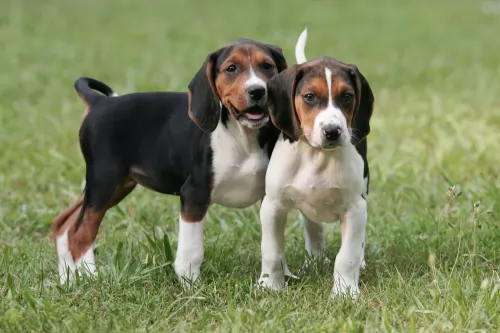 If kept active and happy, the American English Coonhound has very few health problems. The benefit from a large gen pool but do have some health concerns including elbow and hip dysplasia, ear infections, cataracts, bloat, and Progressive Retinal Atrophy. They do have a tendency to gain weight as they age. These issues will be addressed in more detail below. DNA testing is available for the dysplasia and eye issues.
If kept active and happy, the American English Coonhound has very few health problems. The benefit from a large gen pool but do have some health concerns including elbow and hip dysplasia, ear infections, cataracts, bloat, and Progressive Retinal Atrophy. They do have a tendency to gain weight as they age. These issues will be addressed in more detail below. DNA testing is available for the dysplasia and eye issues.
The Bull and Terrier was no doubt a robust breed with few health issues. However his owners of that time would have had to be aware of eye diseases such as cataracts that could have lead to blindness.
Other health issues they would have had to contend with would have been hip and elbow dysplasia, a disease which can cause lameness in a dog accompanied with pain. Because the Bull and terrier was mixed with the English Bulldog, the dog owners would have had to be aware of respiratory health problems, as the Bull dog is a breed that is susceptible to these problems.
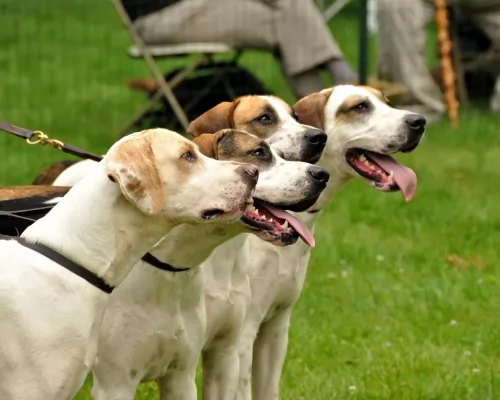 your working American English Coonhound needs different food than one who is not working. So, if you hunt with your dog remember he really needs the calories to keep his energy up. However, they can get obese as they age so cut back with less activity and more years. Watch the number of treats when training.
your working American English Coonhound needs different food than one who is not working. So, if you hunt with your dog remember he really needs the calories to keep his energy up. However, they can get obese as they age so cut back with less activity and more years. Watch the number of treats when training.
Elbow and Hip Dysplasia – the joint issues prevent the bones from connecting and functioning properly. Any good breeder of American English Coonhounds will do tests for both.
Eye issues range from cataracts to PRA (Progressive Retinal Atrophy) Again there are tests available for these conditions.
Bloat is a condition many medium to large size dogs can experience when their stomach can become inverted and intestines distended. The is a situational issue and can’t be predicted. Don’t allow your coonhound to wolf down food right before exercise and feed him more than once a day in a smaller meal.
The American English Coonhound needs a lot of exercise and has an extremely strong work and prey drive.
Long ago the Bull and Terrier was developed to be a hunting dog, and because he was a blend of the English Bulldog and Terriers such as the Staffordshire Bull Terrier and English Terrier, he no doubt had a short coat that would have required being brushed down from time to time.
The Bull and Terrier dog was bred for hunting, and he would have in all likelihood have caught some of his own food. He would therefore have got a lot of protein in. His owners would also have fed him some of their own food too which would have been eggs, home-made bread, rice, fresh vegetables and meat.
He would have had a good quota of raw meat in his diet too and this would have ensured that his coat was shiny and glossy, free of rashes. Dogs such as the Bull and Terrier wouldn’t have eaten commercially produced kibble as that was only introduced in the 1930s.